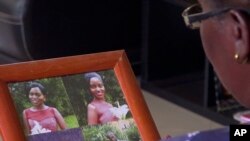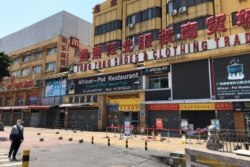In a video shared with VOA, a Congolese student in Guangzhou, China, peeks through a cracked-open door and pleads for permission to leave his apartment.
Speaking in Mandarin, he tells a masked Chinese worker that he has been in his home for two months and has no symptoms of coronavirus. The worker tells him he must stay inside for 14 more days.
“It’s our job, we need to implement this. Because the [pandemic] situation is pretty critical in Africa,” the Chinese worker tells the student.
“But I didn’t travel to Africa,” the student replies.
As China tries to reopen from coronavirus, African residents say they are being singled out for additional testing, quarantine and in some cases, are being evicted from their homes. In a series of interviews, residents told VOA they are the victims of a racist campaign intended to scapegoat Africans for new cases of the virus in China.
Thierry Ndayigengesere, a businessman originally from Burundi who has lived in China for 12 years, said Chinese medical personnel, backed by security forces, are targeting Africans. They are knocking on doors and demanding that residents take a nucleic acid test and submit to quarantine for 14 days. This testing is causing some to fear that they are being experimented on, he said.
“We as Africans wake every morning, and there are people standing at your door, they say you have to undergo this test. So it was a confusing situation because some of us were thinking that ‘Oh, now they want to put the virus in us, not just checking us,” Ndayigengesere told VOA’s Central Africa service.
The fear is compounded by a lack of explanation from authorities. “The fact that there was no information given or a notice before what was happening. It was very confusing,” Ndayigengesere said.
Chinese Foreign Ministry spokesman Zhao Lijian has said foreigners are not being singled out for discriminatory treatment as authorities combat COVID-19.
“We are still facing great risks of imported cases and domestic resurgence. Particularly, as the pandemic spreads all over the world, imported cases are causing mounting pressure,” Zhao said on Sunday. “All foreigners are treated equally. We reject differential treatment, and we have zero tolerance for discrimination."
However, advocates for the Africans say they are being denied basic rights. “We have pictures showing how some people were locked down in their apartments without food. You can’t go out on the street if you are black,” said Mamane Bashir, spokesman for the Association of Nigeriens living in China, in an interview with VOA’s Hausa service. “We accept the fact that everybody should be tested, but if your result shows negative, you should be allowed to walk away, not otherwise.”
Guangzhou has the largest population of Africans in China with estimates ranging between 100,000 and 200,000. On April 7, Chinese authorities announced that there were 16 new coronavirus cases among African residents including some in the area of the city known as “Little Africa.” Since that time, African residents say, they have been targeted.
A Kenyan immigrant living in Guangzhou told VOA that it was once common to see groups of Africans on the street, but now there are almost none.
“You will not see any black person at the market. You will not see any black person at the shop,” she told VOA Swahili service, adding that she and other Africans are speaking to the outside world anonymously because of fear of reprisals. “You will only see a black person only loitering around, not knowing what to do because we’ve been crying and nobody hearing our [cry for] help.”
The Kenyan woman added that one of her roommates was tested for coronavirus and taken away by authorities. She does not know her whereabouts.
“After being tested, they took one of my roommates. I don't know where she is. I don't know because of what we’re going through. It’s getting hard over here.”
This story originated in the Africa Division with reporting contributions from French to Africa service’s Arzouma Kompaore and translation from Mandarin to English by Africa Division's Abby Sun, additional reporting contributions from Central Africa service’s Geoffrey Mutagoma, Swahili service’s Jonathan Muriithi and Hausa service’s Mahmud Lalo.









